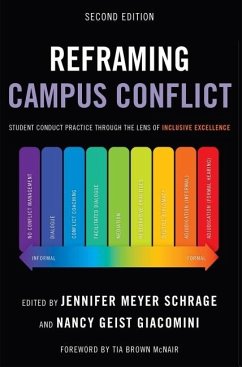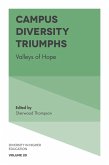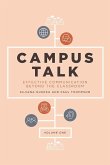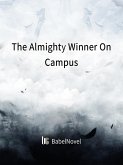Thisfully revised and updated second edition builds upon the original vision of thefirst, which was to give voice to diverse and inclusive perspectives,identities, and practices and to enact the principle that student conduct andconflict response must be based upon foundations of social justice andrestorative justice to disrupt and transform overly legalistic and escalatedmanagement applications in student conduct administration. The Spectrum Model(Schrage & Thompson, 2008) approach centers advocacy for inclusive conflictexcellence by expanding traditional adjudication pathways to include dialogue,conflict coaching, mediation, restorative practices, and shuttle diplomacy fora more robust and inclusive expression of conflict and conductpractices. In theintervening decade, this co-edited work has become more relevant than ever ascolleges and universities continue to be the targets of litigation, activists,lawmakers and public officials who have, for instance, changed the Title IXrules for responding to sexual misconduct. Civility, hate crimes, activism,immigration, nationalism, and free speech are all again on the forefront of challengesimpacting the current campus climate.New chapters cover these and other issues including the unprecedented COVID-19pandemic response and impact on equity and justice in higher education, andamplified calls for racial justice and police reform. The book is furtherenhanced by chapter case studies, summaries and questions for dialogue, toencourage further reflection by the reader and bolster the usefulness of thework as a textbook and campus training guide. The second edition is a must-have resource for broad stakeholders invested ininclusive conflict excellence and principled leadership in education in themidst of a shifting and increasingly polarized landscape. This includes legalcounsel, higher education presidents, senior student affairs administrators andfaculty leadership as well as student conduct practitioners across conductboards, hearing and appeal officers, residential and organizational staffengaged in student facing campus climate work. Reframing Campus Conflictfurther offers transferable content that supports inclusive conflict excellenceinquiry and application in graduate programs, K-12, special education and humanresource management practices. This book is for all educators, administrators,practitioners and leaders committed to engaging campus conflict work throughthe inclusive lenses of social, restorative, transformative and proceduraljustice.This is also available as a set with Student Conduct Practice, Second Edition.
Dieser Download kann aus rechtlichen Gründen nur mit Rechnungsadresse in A, B, BG, CY, CZ, D, DK, EW, E, FIN, F, GR, HR, H, IRL, I, LT, L, LR, M, NL, PL, P, R, S, SLO, SK ausgeliefert werden.









